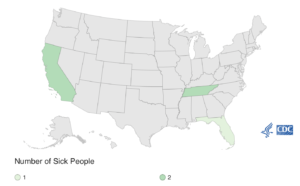As of May 7, 2021, seven people infected with the outbreak strains of Salmonella Duisburg and Salmonella Urbana have been reported from three states. Illnesses started on dates ranging from January 31, 2021, to April 8, 2021.
Sick people range in age from 23 to 72 years, with a median age of 26, and 57% are female. Three people have been hospitalized, and no deaths have been reported.
The true number of sick people in an outbreak is likely much higher than the number reported, and the outbreak may not be limited to the states with known illnesses. This is because many people recover without medical care and are not tested for Salmonella. In addition, recent illnesses may not yet be reported as it usually takes 2 to 4 weeks to determine if a sick person is part of an outbreak.
State and local public health officials interviewed people about the foods they ate in the week before they got sick. Of the six people interviewed, four (67%) reported eating Jule’s cashew brie – the only common product identified.
 Officials from California and Tennessee collected samples of Jule’s cashew brie for testing. Whole genome sequencing (WGS) results showed Jule’s truffle cashew brie collected in both states were contaminated with the outbreak strain of Salmonella Urbana. In addition, the other varieties of Jule’s cashew brie were contaminated with other strains of Salmonella. At this time, we have not identified any sick people who were infected with these other strains.
Officials from California and Tennessee collected samples of Jule’s cashew brie for testing. Whole genome sequencing (WGS) results showed Jule’s truffle cashew brie collected in both states were contaminated with the outbreak strain of Salmonella Urbana. In addition, the other varieties of Jule’s cashew brie were contaminated with other strains of Salmonella. At this time, we have not identified any sick people who were infected with these other strains.
FDA also collected food samples from Jule’s Foods production facility. WGS results showed that raw cashews from the same lot used to make the recalled brie were contaminated with the outbreak strain of Salmonella Urbana.
FDA is working with the supplier of the raw cashews to ensure that all potentially contaminated products have been withdrawn from the market. The supplier has told their customers not to use any of the cashews. The supplier reported that they do not sell cashews directly to consumers.
FDA is continuing to work with the cashew supplier to determine if additional products may be contaminated.